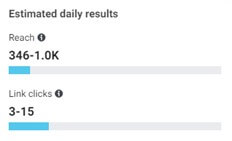
In all honestly, answering the question “how much should you spend on Facebook ads” can feel a bit like answering “how long is a piece of string”. But it is something small business owners and marketing managers ask us regularly so here is some advice to help you set your Facebook Ads budget.
It should be said that the more data you have about your current online audience, the better your Facebook ad spend estimate will be – but we have plenty of tips to help you get started even if you don’t have lots of data yet.
Before you start figuring out how much you need to spend, you need to understand how Facebook ads work.
All Facebook ads must have an objective that comes under 1 of 3 choices:
- Awareness (e.g. post reach, brand awareness)
- Consideration (e.g. post engagement, link clicks, lead generation)
- Conversion (e.g. website action, purchase)
Depending on your objective, you will need to budget a little differently. Essentially, the more you are trying to get out of your audience, the more expensive it will be e.g. getting a user to click on a link is generally more expensive than simply getting them to see a post.
You should also bear in mind that the price will vary depending on who you’re targeting as some audiences can be more expensive than others (particularly in competitive industries).
What is the minimum Facebook ad budget you need?
If you’ve never run Facebook Ads before, you may be interested in knowing the absolute least amount (industry and objectives aside) you can get away with spending is.
You need to spend at least £1/day on Facebook Ads for the system to work correctly – so if you are planning to run ads for a month, you’ll need a total budget of at least £30. However, you will often need slightly more than this to reach a large audience, to see results and get enough data to make informed decisions about the future of your campaign we recommend budgeting for £3/day (i.e. £90/month).
How much should you spend on Facebook ads for awareness
To calculate how much you should spend on ads that raise your awareness, use this formula:
Average CPM X (Desired Results/1000) = Budget
Over the last few years, the average CPM (cost per thousand impressions) has increased for all industries advertising on Facebook. At the moment, it’s currently hovering around £3 – hence why we recommend this as your absolute minimum daily budget.
The average CPM for your specific ads may be significantly higher or lower than this depending on your industry, audience behaviour, and targeting but if you do not have any previous data to base your calculations on we recommend using this as your average CPM e.g. £3 (Average CPM) x 20 (Desired Results: 20,000 people reached/1,000) = £60 Ad Budget
How much should you spend on Facebook ads for consideration
‘Consideration’ on Facebook includes a variety of audience interactions from engaging with a post to clicking a website link to filling in a lead form – and the average cost of each will vary. Use this formula to calculate how much you should budget when running ads for consideration on Facebook:
Average Cost Per Interaction X Desired Interactions = Budget
Once again, the more data you have the more you can tailor your ad budget for Facebook ads but if you don’t have a lot of historical data on your audience, here are some industry benchmarks for the average Cost-Per-Click (CPC) you can use to run your first test campaign. (Source)
| Industry | Cost-Per-Click (CPC) |
| Apparel | £0.33 |
| Auto | £1.63 |
| B2B | £1.83 |
| Beauty | £1.32 |
| Customer Service | £2.24 |
| Education | £0.77 |
| Employment and Training Job | £1.97 |
| Finance and Insurance | £2.74 |
| Fitness | £1.38 |
| Home Improvement | £2.13 |
| Healthcare | £0.96 |
| Industrial Services | £1.56 |
| Legal | £0.96 |
| Real Estate | £1.32 |
| Retail | £0.51 |
| Technology | £0.92 |
| Travel and Hospitality | £0.46 |
Example: Industry – Fitness, Desired Interactions – 30 Link Clicks
£1.38 (Average CPC) X 30 Link Clicks = £41.40 Ad Budget
How much should you spend on Facebook ads for conversions
As with the consideration objective, conversions can include a variety of actions from purchases to sign-ups to store visits. The most common conversion objective for businesses using Facebook ads is for the user to complete a monetary transaction. The average cost of getting a user to complete a conversion is known as your Average CPA (Cost-Per-Acquisition or Cost-Per-Action).
To calculate how much you need to spend to achieve your desired number of conversions, use this formula:
Average CPA X Desired Conversions = Ad Budget
Over time, you will gather more data on what the average CPA for your individual business is, but until that point, here are some industry benchmarks to help you calculate your first Facebook ad budget. (Source)
| Industry | Average CPA |
| Apparel | £8.00 |
| Auto | £31.92 |
| B2B | £17.31 |
| Beauty | £18.56 |
| Customer Service | £22.65 |
| Education | £5.72 |
| Employment and Training Job | £16.92 |
| Finance and Insurance | £30.17 |
| Fitness | £9.68 |
| Home Improvement | £32.52 |
| Healthcare | £8.96 |
| Industrial Services | £27.82 |
| Legal | £20.90 |
| Real Estate | £12.32 |
| Retail | £15.63 |
| Technology | £40.20 |
| Travel and Hospitality | £16.38 |
Example: Industry – Beauty, Desired Conversions – 15 purchases
18.56 (Average CPA) X 15 (Desired Conversions) = £278.40 Ad Budget
How to check your ad budget before your ads go live
As we’ve mentioned, numerous factors will affect exactly how much you need to spend on Facebook ads to achieve your desired outcome. Once you have worked out an estimate using the guidance above, set up your campaign and ad set in Facebook Ad Manager to see what your predicted results are when your audience targeting, location, and timescale are factored in.

How to make your Facebook ad budget go further
One of the most cost-effective ways to use Facebook ads is to create ad funnels that split the spend and ad messaging between users at different stages of the journey. I.e. your conversion budget only gets spent on warm leads who know and like your brand while your awareness budget gets spent on reaching cold leads who have never heard of you.
Simply remarketing to your existing audience is also a popular way to use Facebook ads and reduce the budget needed – e.g. targeting past customers or visitors who abandoned their purchase.
Finally, one of the most common reasons Facebook ads with limited budgets fail is because they are not left to run for long enough. With a smaller spend it’s going to take the algorithm much longer to get your ads to enough users to build an understanding of what works best for your brand so you need to factor in a longer timescale for your ads to run.
Facebook ads can be incredibly complex with over half of small businesses feeling like they’re failing. If you have questions or need help running your ads across any social media platform, including Facebook ads, reach out to our team for a chat to see if we can help.
Facebook ads spend – FAQs
How much do I need to spend on Facebook ads?
Small businesses typically spend between £1000–£3000 per month (~$1000–$5000), while some spend over $3,000/month.
How much do Facebook ads cost per click (CPC)?
Average CPC is about £0.55 ($0.70)
WordStream reports an average of $1.72 across all industries
How does Facebook ad spend work?
You choose a daily or total budget, select your ad objective, then Facebook bids in an auction. You’ll pay up to your set limit when someone clicks or views, depending on your goal.
How to set a daily spending limit on Facebook ads?
Go to Ads Manager → “Budget & Schedule” → select “Daily Budget” → enter the total amount you want to spend. Facebook won’t spend more than that each day.
How to change ad spending limit on Facebook?
In Ads Manager, find your campaign/ad set, click “Budget & Schedule”, adjust the figure, and save. Your new limit will apply straight away.
Why are my Facebook ads not spending?
This can happen if your bid is too low, audience is too small or restrictive, ads are still under review, or you’ve hit a spending cap on the account.
Mini Facebook ads spending breakdown
How much should you spend on Facebook ads per day?
Start with £5–£10 daily. It’s enough for beginner testing without overspending.
How much should you spend on Facebook ads per week?
That equals £35–£70 weekly, which is great for testing and learning.
How much should you spend on Facebook ads per month?
Aim for £100–£300 monthly if you’re testing or running small campaigns. Most small businesses fit in this range.



